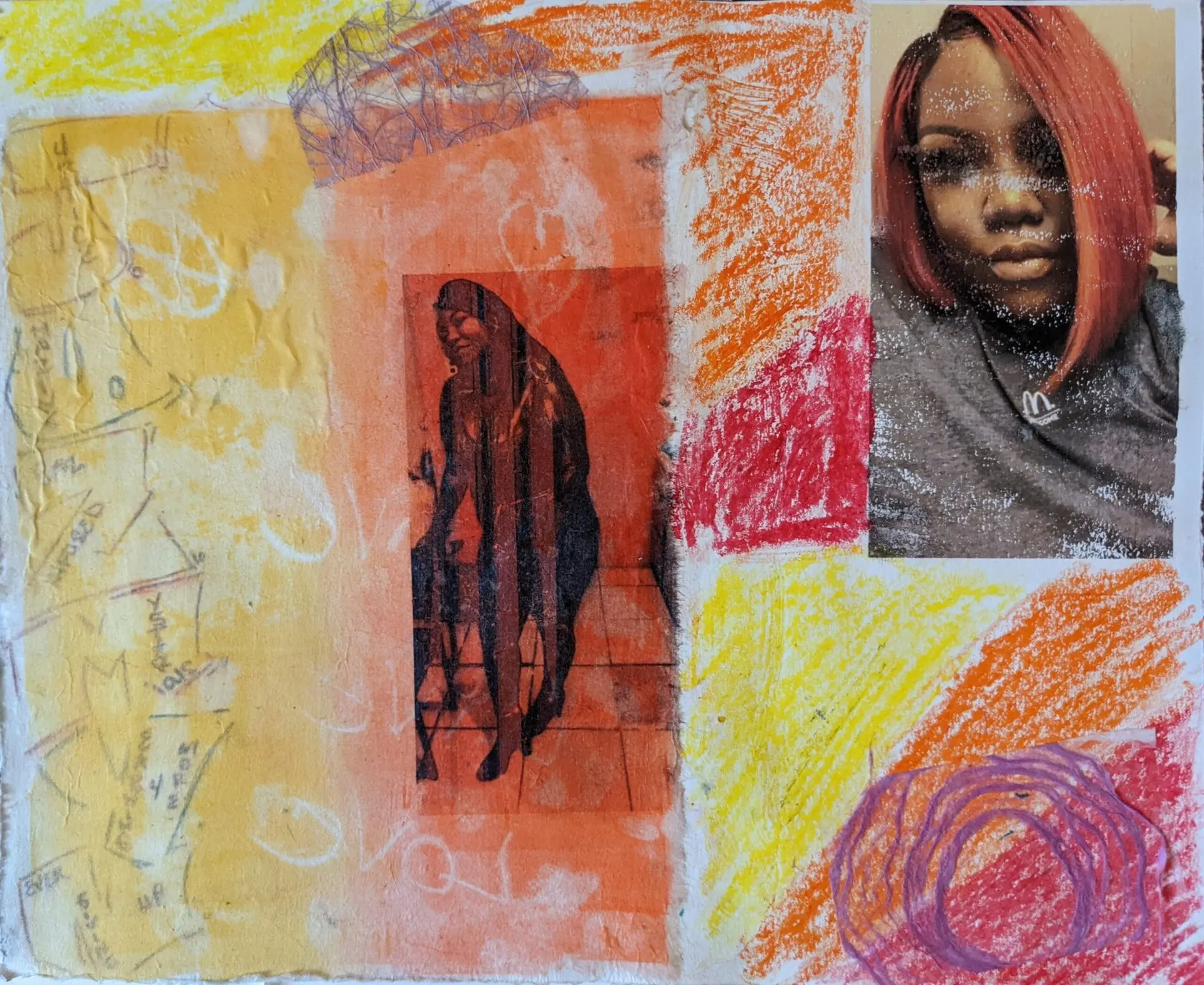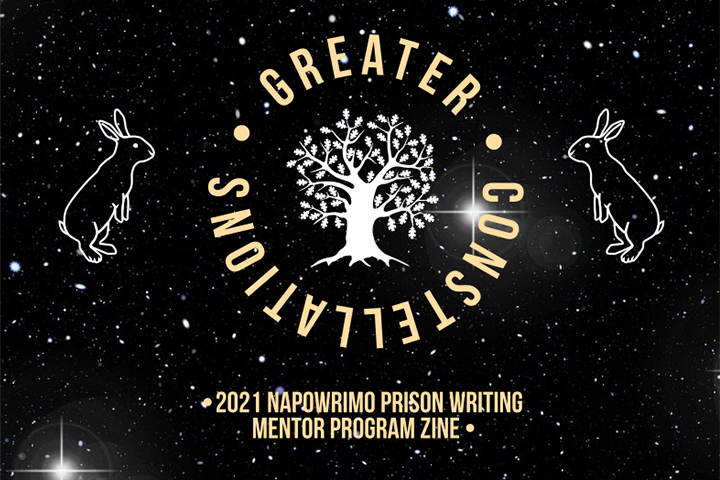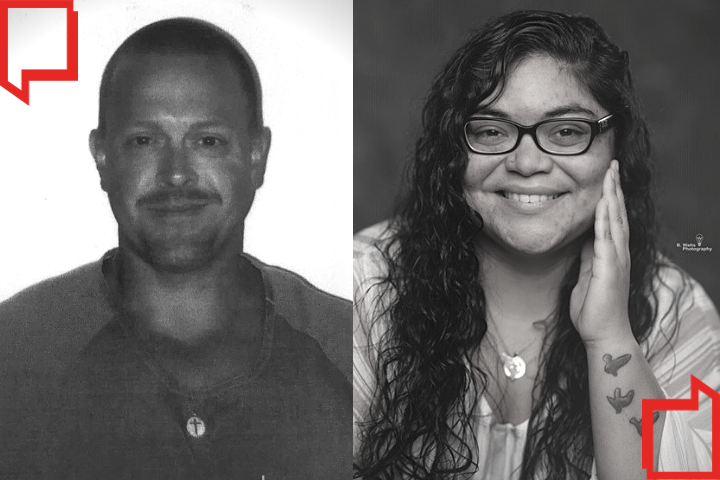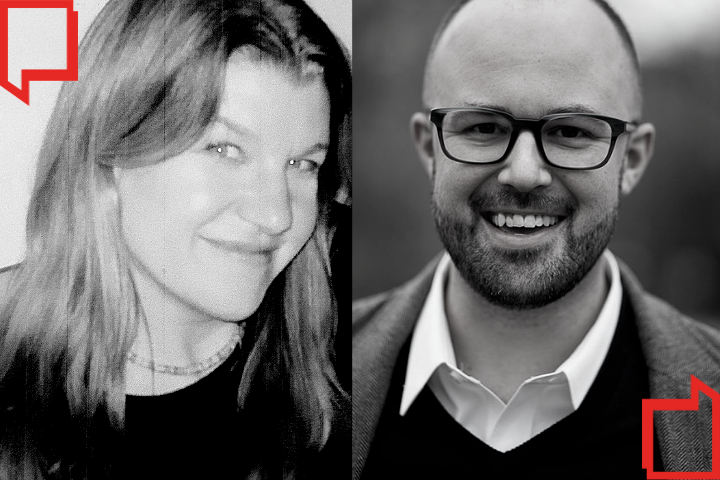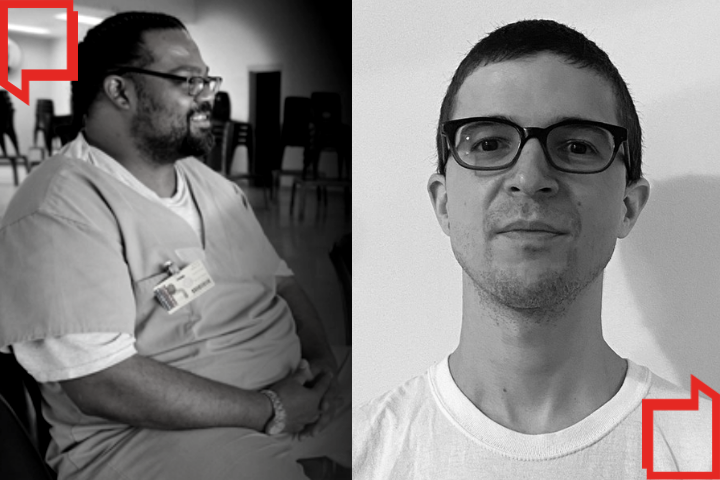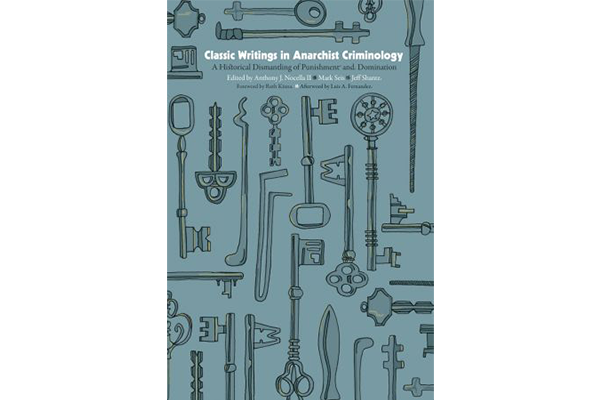Julian Blanchard was awarded the Fielding Dawson Prize in Fiction in the 2022 Prison Writing Contest.
Every year, hundreds of imprisoned people from around the country submit poetry, fiction, nonfiction, and dramatic works to PEN America’s Prison Writing Contest, one of the few outlets of free expression for the country’s incarcerated population.
People have always been resentful of disapproving remarks I make about others, whether regarding their taste in music, out-of-control egos or lazy thinking. Still, when you’re in an eight-man prison room that’s the busiest, loudest meeting place for business planning sessions in your unit, you’d have to be a saint not to resent the Olympic-level displays of inconsideration and rudeness that I had been subjected to since a supposedly mega-rich entrepreneur named Kenny moved in.
He was in his thirties and looked like a grizzly bear with a clean-shaven face and a modified Mohawk. Kenny had people eating dreams out of his hand and licking up the crumbs. Forgive me for this latest outburst of unfavorable judgment, but there was nothing you could mention–from wineries to water parks–without Kenny spinning what had to be a phony tale about how he used to own one of those.
Kenny claimed to have grown up poor and he was highly adept at peppering his speech with Black slang. He connected unusually well with Black men, as well as with Latinx inmates. You’ve never seen such unquestioning approval lavished upon a white collar offender by such a vast array of mostly drug-trafficking tough guys. People dropped into our room for an interminable series of shouted discussions about cryptocurrencies and all kinds of investments.
These men were not readers, and talk was their thing. They were not enthusiastic about working for others. They craved not just houses, but mansions; not just average-sized motorboats, but multi-million-dollar yachts. And all of this had to be theirs with a minimal expenditure of effort.
I made a point to slap on headphones and tune into a jazz station or NPR whenever Kenny held court; I didn’t want to know anything about inmates’ business activities, which–in many cases– were likely to be questionable.
Still, perfect vigilance is hard to achieve, and I was well aware that a good twenty or so men in my unit–led by Kenny–were investing in an app that was supposedly under construction by Kenny’s employees, whose work had not not been affected by his incarceration. Kenny spent hours on his phone every day tending to his business affairs.
The product that these inmates hoped would make them yacht-and-mansion rich was a game aimed at males twelve to twenty. That it challenged players to kill as many faceless attackers as possible was hardly an innovation. What was new is that the game taught math and language skills. Before a player could shoot a foe (or a cluster of them), he would be required to solve an equation in which the “knowns” were the distance involved, the location of the target and the speed at which the enemy was moving. All of these factors figured into a successful shot.
To receive info from “spies,” a player would have to choose the grammatically correct sentence from five possibilities.
I have to admit that I was impressed by the idea of an atypical violent game–one that was actually educational. It was called ClassyKill.
Kenny’s eyes blazed with passion as he bragged about the bona fides of his app builders. He had wooed one of them from Google and another one from Apple.
My focus was on neither Kenny nor any of his typical followers. Instead, the person who had captured my attention was a baby-faced inmate named Will, who had attached himself to Tyrone, Kenny’s second-in-command.
Will was a pale, anemic–looking kid who had to be nineteen or twenty. I had heard that he’d gotten ten years for his involvement in a cocaine–selling operation. A jailhouse lawyer told me that Will’s judge had given him two years below the guidelines because Will was so skinny and young–looking that he would have been unusually vulnerable in prison.
It would have been worse if he had been a sex offender; at least he had some status as a drug dealer.
Watching this innocent–looking boy–man stand by silently, absorbing who knows what from Kenny’s Board of Directors meetings got to me. Will’s expression never changed; his face seemed to have been carved into a mask of contentedness, remarkable in such a young person in such miserable circumstances. I could only think that he believed he was learning valuable lessons from Kenny and Tyrone. He spent more time with the latter, watching him pitch ClassyKill to inmates on all three floors of the unit. Tyronesold shares in the company that owned the application. Undoubtedly, Tyrone would have had his own side projects, like fending food stolen from the chow hall by the kitchen workers, or arranging for paying customers to receive their purchases early in the two-hour shopping ordeal at the commissary–sometimes in rain or snow.
Will seemed too socially skilled to be on the autistic spectrum. He lingered in the bleak hallways, talking with one or another inmate his own age on a regular basis. For roughly four hours a day, however, he served as a lookout for Kenny, who spoke endlessly on his cell with his business-partner, brother, and others, using a storage room only accessible to a few housekeeping orderlies as his office.
The guards rarely made their way to that end of the unit, but the consequences for getting caught with a phone were too severe to risk. Will, presumably, would shout out some code word that would give Kenny enough time to stash his phone somewhere, and maybe to exit the room if the guard was still at the far end of the long hallway.
I saw Will five or six times a day on my way to the floor’s restroom or to fix a mug of coffee at the 190-degree urn. He had a slumping posture, and despite his six-foot-frame, and string bean physique, a bit of paunch was already forming around his navel. A pair of nerdy glasses did not help his image.
The kid looked like his best days were already behind him. The white water rapids of prison life were carrying him downstream to a bad place, and I wanted to help. If I could.
The question did cross my mind: Who was I to rescue him? There can’t be too many doctors who get convicted of a felony. Malpractice? Sure, that was common. But a crime that got you locked up? It was uncommon for a doctor to get into that kind of trouble.
When I completed my cardiology residency, I signed up with a five–partner group. Around my fourth month – by which time I suppose I had proven my worth – the office manager, a thirty-five year old woman with bright red hair, called me to her office and told me to close the door. She explained that we all generated “a bit of extra income for the group” by sending blood and urine specimens drawn in our office to a certain lab that returned the favor by discreetly handing us bundles of cash at a safe location. I think she left out that last detail.
We got busted.
One of the cardiologists had a lawyer who got his conviction overturned on a technical error. The rest of us weren’t so lucky; we all got five years of incarceration for taking kickbacks.
The judge paid no attention to who had set up the arrangement with ReliaLabs and who had gone along with the flow to remain employed. I had seven months left to go.
I broke the law, but other than taking part in the scam, I led a law-abiding life. Will, the Intern, gave every indication of heading toward a lifetime of crime. He was apprenticed to Tyrone, who was an armed bank robber until his luck ran out. As flawed a human as I may have been, I still shuddered at the thought of an overly impressionable young person circling the drain, so to speak. Will looked far too comfortable with his pitiful surroundings and shady associates. The perpetuated grin he wore intimated that he was proud of his position in the scheme of things.
I hadn’t ever spotted Will using the unit’s wall-mounted phones or sending email. It was as if he had no family and Kenny and Tyrone served as surrogates.
In the roughly five months that Kenny had been holding ClassyKill business meetings in our room, I had made a point of wearing headphones, as mentioned earlier. Out of curiosity, I sometimes set the volume on my radio to zero and eavesdropped on the presentations.
The room full of usually boisterous men were all quieter than the average librarian. Kenny was a highly skilled public speaker, and as he revealed that the app was now available on Amazon, I could practically hear hearts beating faster and louder around me. There were famous rappers, Kenny assured the group, who wanted in on the action. They could use their celebrity to promote the product. Their names could not be revealed until contracts were signed.
Kenny also spent some time going over the company’s creation of its own branded cryptocurrency. Shareholders now had tokens in their digital wallets. Bitcoin and the other relatively new digital currencies were still a mystery to most people, and this group was not likely to have a firm grasp of the complexities involved or of the conversation factors that were employed to arrive at their number of tokens.
To keep his investors motivated to recruit more shareholders– both incarcerated and “on the street” – Kenny announced the latest recipients of his generosity. Each week, he and Tyrone chose the hardest working “team member” and gave him a gift that sounded like a fortune. This week’s winner got ten million tokens. From bits of conversation I’d heard in the room, I knew there was a grand total of hundreds of billions.
After trumpeting the glowing review that ClassyKill was accruing Kenny lowered his voice.
“There are three or four people spreading nasty rumors. I’ll be giving them their money back. Listen, we don’t need money from negative individuals who aren’t willing to spread the word and bring influencers onboard. I’m not in this for the money; I want to strengthen people’s skills and give them greater opportunity.”
There was applause.
“If anyone here wants a refund, see me after we wrap this up.”
No one looked inclined to disengage himself from the project.
Finally, Kenny declared that there would be a $75 bonus for every new investor of $500 or more that a shareholder delivered.
It all sounded like a scam. Most inmates are not savvy investors, and Kennny’s did not impress me as exceptions. While I was vaguely aware of cyber currency, I had never heard of wallets or tokens. There were too many ways for this bunch of selectively trusting men to get swindled. And why would someone with Kenny’s massive wealth want to share the riches generated by his latest business adventure when he could finance the product himself and reap all the benefits?
An hour after the session in my room wrapped up, I went to return a friend’s book and passed a side-hallway where Kenny spent most of his day on his cellphone, in a storage room, running his business.
A guard oversaw two inmates waxing the floor.
Sixty feet farther down the main hall, I ducked into the restroom. From the stall next to mine came Kenny’s highly recognizable voice: “A couple of assholes made some noise this week, talking shit about us. I’m gonna cash them out, maybe give them a little extra to shut ‘em up.”
It had to be his brother Chuck, who had avoided legal problems so far on the phone. Kenny was in for what some guy said was insider trading and others said was tax evasion. He had a six-hundred-an-hour attorney working for him. I didn’t dare try to look up his case in the electronic law library. Too easy for a nosey inmate to look over my shoulder.
When I left my stall, Will was standing guard a short ways down the corridor, in the direction I had come from. I turned right, delivered my friend’s book and stayed to chat for a while, hoping Kenny and Will would have moved on.
Fifteen minutes later after I left the bathroom, Will was gone.
The next time my unit got to use the recreational library, I found a book I’d seen before about avoiding financial scams. Ducking into an unlit, empty classroom, I quickly cut out the page on pyramid schemes. I returned the book to its previous location.
The Grammys were broadcast two nights later, and every TV room on all three floors were packed. Will lived on Two. I knew his room number because my friend Q was next door. I had passed Will’s two-man while he was reading in bed. Now, I darted in and slid the pirated page under his pillow. I was out in three rapid heartbeats.
Stretched out in my bunk, waiting for sleep to settle in, I kept trying to convince myself that Will was bright enough to appreciate the similarities between what was described on the page and the machinations unfolding around him. But that was only a guess.
The next afternoon, Will and Tyrone huddled together near a filthy, dilapidated water fountain at the end of the hall. On my way to the showers, I kept my gaze low, not wanting to reveal my interest. Still, I saw enough to know they were seriously concerned about something. And pissed off.
Tyrone didn’t do his usual fake, high-pitched, tight-throated laugh. Instead, he shook his head with an angry expression on his face.
The remainder of the day, Will attended to his watchman duties, slowly pacing over the twenty-foot stretch of hall that would let him signal Kenny that a C.O. was near.
When the next weekly summit in my room rolled around, I pretended to listen to the radio and listened to every word. As usual, Kenny lavished praise on his most vocal cheerleaders–the guys who feverishly worked their phones and pulled in the new ClassyKill investors. They were also the ones who delivered the lourdes and most scathing denunciations of the “rumor mongers.”
Kenny said nothing about the attempt to shake Will’s confidence in Kenny’s integrity. Maybe, I thought, Tyrone had told Will to tell no one.
Two guys I knew heard that Duke, reportedly a leader of the badmouthers, had been attacked with scalding hot water in the shower. That would be an effective way of tamping down criticism.
It banished from my thoughts any consideration of escalating my campaign to steer Will away from his poorly chosen influences. I stopped thinking about The Next Step.
A week later, The Next Step took place with no effort on my part. One night, when my roomies all headed to watch an action movie that was screening in the TV room, I stayed put, glad to have a little peace and quiet.
Minutes after my roomies left, Will came in and set some macs – we used packets of mackered as currency– on Kenny’s bunk. It was common for inmates to pay him for one thing or another.
Will came over to where I was reading, using my locker as a backrest.
“What’re you reading?”
“An old issue of The New Yorker. The new one is overdue.”
He stood there, silent. I already had the feeling that his social skills were weak.
“Will,” I asked,” what will you do when you get released?”
His flat expression didn’t change.
“ClassyKill’s gonna make me a shitload of money.”
“What if it doesn’t? It’s good to have a backup plan.”
“If it doesn’t, I’ll see what Tyrone’s got going on. We get out three months from each other.”
The urge was too strong to resist. I hadn’t expected to be in a moment like this.
“How old are you, Will?”
“Twenty-one. Why?”
“You seem like a bright guy– like someone who’d be trying to plan a future for himself.”
“I just told you about my future.”
“Let me be honest with you, okay? What Kenny’s working on sounds iffy. It’s aimed at young people doing lousy in school, lousy at their first job. Who knows what their taste is?”
He was paying attention. Maybe I could get through to him.
“They may think your game is condescending –that it treats them like second-graders. And even if it blows up…I doubt that you’ll get what you should.”
Will took a step backwards and crossed his arms. I had made a mistake.
“This is a weird convo, man. I ask you what you’re reading, and you turn into my guidance counselor or whatever that was.”
I made a dismissive motion with my sweaty hands. “Sorry, I get that way sometimes.” I should have shut up but I didn’t.” Maybe I was a therapist in another life.”
The grin I summoned up went unreturned. Will left without a word.
As usual, Will spent the day as a hallway lookout while Kenny conducted business on his cell in the utility room. His body language English was the usual: slouching posture, impassive expressions and straight-ahead gaze. Eight or nine times that day, I entered the corridor and tried to causally glance to my left, in Will’s direction.
There was no sign of any Tyrone-Will tête-à-tête. It looked like the intern was keeping my indiscretion to himself. Being seen as a would-be bubble-burster by a bunch of true-believer inmates–many of them from mediums–would not do wonders for my personal safety. These guys were desperate to get rich quick and they clearly believed that keeping the group spirit up would work some kind of magic. The last thing I wanted to do was piss them off.
I breathed easier in the morning. No one had attacked me in my sleep. My mini-sermon to Will was a serious mistake, but he had kept it to himself, possibly to avoid an awkward and unpleasant discussion with Tyrone.
The next night, my bladder called out to me around midnight, and when I came back from the bathroom, my roommates were all somewhere else. It didn’t seem too strange because most of them came alive at night, shooting pool, watching TV or talking in the hall. Still, of the seven, at least one or two would be in bed.
I set my alarm for seven and drifted off. But not for long. Something that felt like a sledgehammer thundered against my forehead.
The word “stroke” screamed itself in my mind. But then someone was wrapping the blanket tighter around my head. Strokes and headaches don’t do that and feel like wool.
I threw my hands in front of my face only to have my finger viciously battered with the same weapon, which was, of course, a combination lock in a sock according to the ER doc who saw me that night. She’d seen wounds like mine before.
The beating went on for another thirty seconds, moving on to my upper back until I rolled off the bunk and onto the floor, with my useless fingers somehow gripping the blanket and pulling it tight around my head as if it could protect me. I used my legs and elbow to maneuver myself into position under my bunk.
At that point, the attack ended.
One of my roomies ran in soon after, trailing a night-shift guard, and I was taken to an ER where I was diagnosed with two fractured fingers and a concussion. At least my skull wasn’t cracked.
I spent two days in the hospital under observation. Back on the compound, I was moved to another unit. My attacker–or attackers– was never identified. I doubt that Kenny or Tyrone would have engaged in an act of violence and risked being sent to a “medium.” They would have one of their flock go after me—maybe in exchange for shares.
Fortunately, my fractures were non-displaced, and wearing a short arm cast for a few weeks wasn’t much of a hardship. No threats were directed at me in my new unit.
The big news was that I heard back from Channa Roy, a good friend since we were cardiology residents together. He convinced his group’s partners that my offense was an aberration, not a true reflection of my character. His practice hired me.
My wife Sharon had stayed by my side during my incarceration.
Four months after I was attacked, I was released. Sharon had already rented a house for us, in Madison, Wisconsin, where my new job was. She found a position as a nurse practitioner a month after our relocation.
Two years into our new lives in Madison, I received a letter from Will’s brother. The conditions of Will’s release–like those of my own–prohibited him from “associating” with anyone he knew to be a convicted felon. Will’s lawyer was confident, though, that a single letter, sent to my attorney and forwarded to me, would not be a problem.
Will wrote:
Roger, I went home fourteen months ago. My family has been hard on me, lots of things I can’t do. My dad is teaching me what he does — carpentry. Don’t know if I want to do this forever, but I’ve learned a lot.
You were right about Kenny. None of us got shit. So many excuses!
I apologize for what happened to you. I didn’t know what they would do but I should have kept my mouth shut.
Because of the rules, you won’t hear from me again. Just wanted to say I’m sorry and I know you were trying to help.
Will
I stayed focused on my work but I get a little rattled when a cop car looks menacing in my rearview mirror. Maybe that’ll wear off in time.
Will was a young man who latched on to the wrong people, attracted by swagger and the lure of easy riches. Someone needed to knock him off the course he was one. I’ll never know for certain, but I think he’ll do okay. As for me, I know what I need to do.
Purchase Variations on an Undisclosed Location: 2022 Prison Writing Awards Anthology here.

